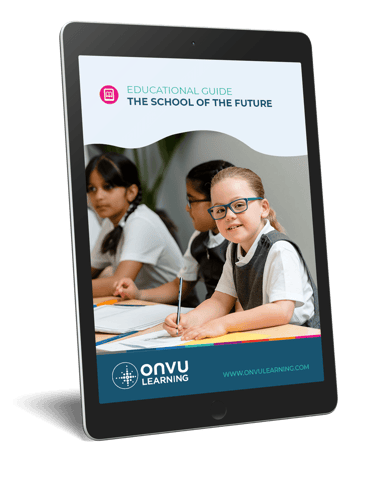- Lesson Observation Blogs
- 3 Minute Read


Last week the hashtag #nobservation was trending on Twitter, used by a large group of teachers venting their frustrations about bad lesson observation practices. Teachers were following the suggestion of Mr Pink (@Positivteacha) and venting their fury about various indignities they’d suffered over the years when being observed.
Taken together they’re a pretty damning indictment of the way bad lesson observation can go, which should be about improving teaching and learning, have become all about bureaucratic box-ticking, following the latest unproven trend, meeting the supposed needs of external inspectors or just showing who is boss in a school – with no impact on learning and negative impacts on morale and staff retention.
It reinforces our determination at ONVU Learning to reclaim observations – to use video technology, professional coaching and a clear focus on individual teachers’ professional needs to help teachers develop, stay in the profession and help their schools and the students in them succeed.
We’ve taken some of the worst #nobservation tweets and the flaws they reveal and matched them to the real feedback we’re getting from teachers who are working with ONVU Learning.
1. In-person observation is intrusive and affects lessons
Once had five observations coincide with the same 1hr lesson – two staff in for book-looks, two in to give a general graded observation, and one in to check differentiation and SEN provision. Feedback? “Pupils seemed distracted.” @_JAPickard
SLT shouting “bollocks” loudly when his laptop shut down halfway through, graded down as students were laughing. #nobservation @StewFraz
My definitive corker of a #nobservation was when I was observed by our school’s Scary Deputy Head (who I had a lot of time for, he was no fool), with year 7. “The class all seemed very nervous…” ?@requiresimprovement
Versus…
‘Video observation means teachers can review far more lessons and remove the distractions provided by an external observer’ David Horton, Orwell Park School
2. Formulaic observation is demoralising and of little value
My last lesson observation before resigning my HoD post and leaving teaching (there was a correlation between the two): “It would be an outstandingly creative lesson but…they made too much progress…for Set 3″ @_SaffyBi_
I’m going to have to not pass this one unfortunately, as you didn’t deploy the TA effectively enough” said my PGCE mentor, in a class with TA ? #nobservation @misscnqt
Told my lesson was RI once, when I asked for feedback on how to improve the response was ‘book your observation in earlier because we had already hit our quota of good teachers before we made it to you!’ #nobservation @miss_coster
Versus…
‘Staff are becoming more reflective and slowly evolving a language to pinpoint key moments in their lessons and the impact they are having on learning. This allows us to have a much wider discussion and become more collaborative in our approach to personal development’, Mr Varey, Head of Maths, Hereford Academy
3. Observation isn’t for the benefit of the observer
Another #nobservation, I was once told that my lesson was great, but “you should have stopped the students from working and done some mini-plenaries so that the observer could see learning was taking place..”. @Darrenmacey
#nobservation Asked why I hadn’t done any whole class questioning. Replied that I had extensively questioned before he walked in. Told that “most people” would wait until observer arrived! Extra ridiculous as he hadn’t said when he was coming. @McKntyre
Versus…
‘[ONVU Learning] gives the ownership of professional development to the teachers so they can reflect and develop their skills’, Dan Thomas, Executive Headteacher, The Learning for Life Partnership.
4. Observation needs expert and useful feedback
A colleague was graded 4 because the (German) lesson was all in German and the observer couldn’t speak German so “didn’t know if it was any good”. True story! @TeachEnglish146
“I haven’t heard of the philosophers that you were teaching about.” Genuine piece of #nobservation from a Maths-specialist SLT who observed my Philosophy lesson years ago. @hugohutchinson
#Perhaps you could have dressed up as Samuel Pepys. Bring the history alive. ? #nobservation’ @Rosemarycalm
Versus…
‘Dr Sean Warren’s methodical and diagnostic approach to reflective practice allowed me to start thinking about where issues were arising and whether they [warranted] short or long-term fixes.’ Mr Morris, The Hereford Academy
To find out more about our alternative – video based observations that are non-intrusive, flexible, all about the teacher and allow sharing and expert feedback – please get in touch!
You can see the full horror of the hashtag #nobservation directly on Twitter.
——-
Links to tweets
https://twitter.com/misscnqt/status/961337904453902336 – tickbox
https://twitter.com/StewFraz/status/961352123723198464 – Hawthorne!
https://twitter.com/miss_coster/status/961317982860464129 – formulaic
https://twitter.com/Darrenmacey/status/961244885448785920 – for the benefit of the observer!
https://twitter.com/_SaffyBi_/status/961163213164380160 – link to recruitment and retention
https://twitter.com/Mckyntyre/status/961157408189009920 – waiting until observer arrives!
https://twitter.com/_JAPickard/status/961142836887539714 – 5 observers – Hawthorne effect!
https://twitter.com/Rosemarycalm/status/961140339913392128 – bizarre advice re teacher dressing up
https://twitter.com/SJGarner76/status/960988659632803841 – pointless criticism
https://twitter.com/TeachEnglish146/status/960960039258329089 – lack of experts (could be accessed by video?)
https://twitter.com/hugohutchison/status/961272153365794816 – another non specialist (Maths observing philosophy)

The School of the Future Guide is aimed at helping school leaders and teachers make informed choices when designing the learning environments of the future using existing and upcoming technologies, as they seek to prepare children for the rest of the 21st century – the result is a more efficient and competitive school.
KEEP IN TOUCH WITH ONVU LEARNING AND RECEIVE THE LATEST NEWS ON EDTECH, LESSON OBSERVATION, AND TEACHER TRAINING AND DEVELOPMENT.